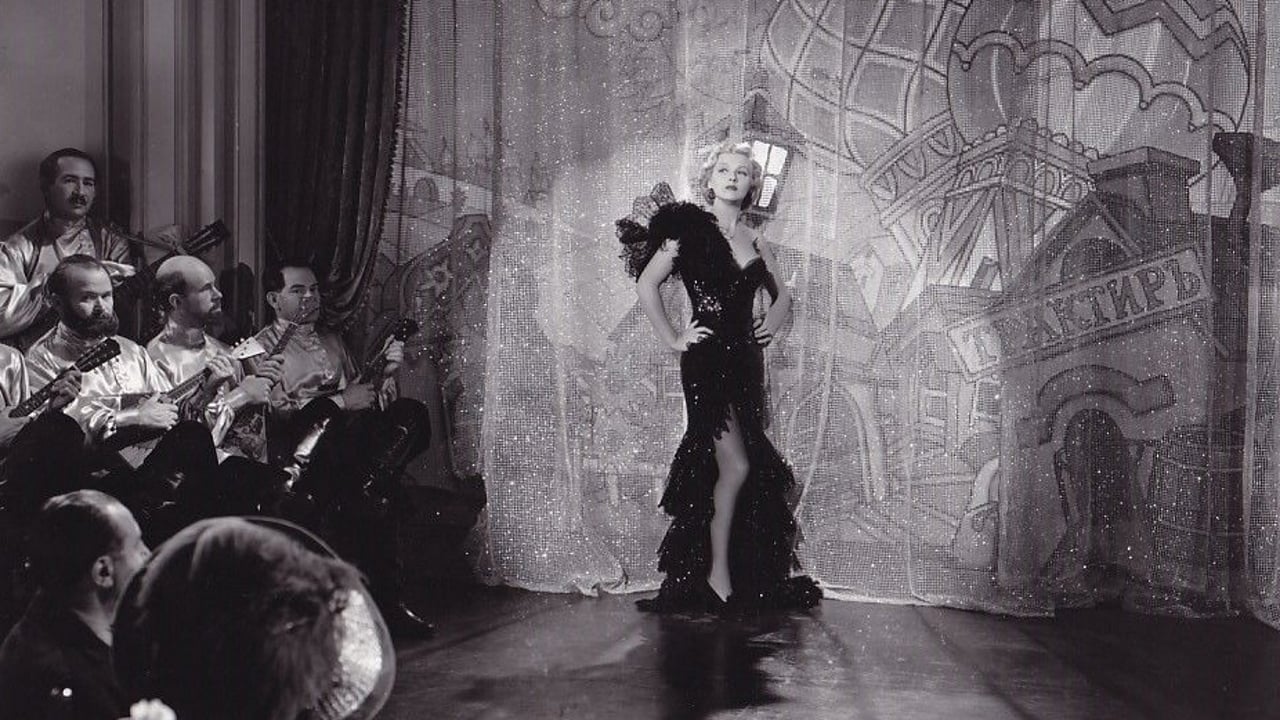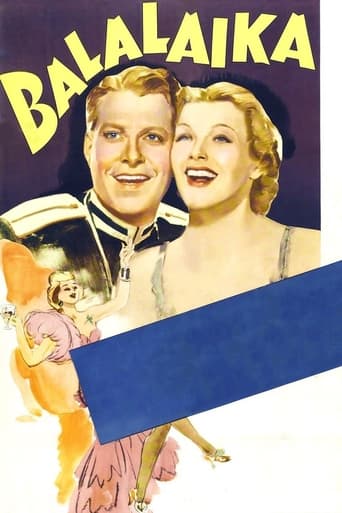



Good start, but then it gets ruined
Did you people see the same film I saw?
Absolutely amazing
One of the worst ways to make a cult movie is to set out to make a cult movie.
View MoreIn "Balalaika," Nelson Eddy plays Prince Peter Karagin, an officer in the Cossack army. One night he sees the beautiful Lydia Marakova, who sings in a St. Petersburg café. Lydia is truly of the people, not one to like royalty, so he poses as a voice student in order to meet her. He wins her over. In fact, Lydia, her father, and her brother are part of a revolutionary movement. When Peter and his Cossacks break up a rally and her brother is killed, both learn the truth about one another. However, Lydia is still in love with him. When she learned that the rebels were going to assassinate Peter and his uncle at the opera house on her opening night, she tells him not to come, that she will be too nervous with him and his uncle there.On stage, just as she feels she can relax because they're not there, they show up in their opera box. In the middle of the opera, war with Germany is announced.Not much of a movie - Massey is lovely, kind of a cross between the young, stunning Zsa Zsa Gabor and Scarlett Johansson -- but in order to play opposite the wooden and unexciting Eddy, you need Jeannette McDonald's fire and sparkle. What Eddy had going for him, besides good looks, was one of the greatest voices in film, and he sings here like an absolute dream. Massey had a pretty voice, but her top was screechy, and in the first number she sings, she's flat.The rest of the cast is good - Lionel Atwill, Frank Morgan, Charles Ruggles, and C. Aubrey Smith, all top pros.Mildly entertaining, notable for Eddy's vocals.
View MoreWhy this wasn't more successful is a mystery. It had good tunes great sets, marvellous supporting cast so what was the problem. Nelson Eddy was in fine voice and wore the Russian costumes well, so we come to Illona Massey .It beggars belief that Massey didn't become a bigger star. It shows what glut of talent there was at Metro at the time.Also she wasn't Jeanete Macdonald the public wanted her and Eddy together his liasons with Massey seemed like adultery to the fans. However lets examine here case ,she was lot sexier that Macdonald- Hollywood has never been good at handling real sexiness ,it was falsified and made safe by Lana turner etc, Massey was womanly in its best sense she also looked like a man-eater and that alienated women and frightened men .To describe her as an opulent blonde is an understatement. Not only was she stunning to look at but could sing as well as Macdonald and was streets ahead of the over sweet shrillness of Kathryn Grayson and Jane Powell. MGM kept Massey on long leash in case Macdonald became troublesome. Massey resurfaced gloriously in holiday in Mexico making Walter Pidgeon smoulder in way he he never did with Greer.Massey finally achieved some sort of immortality in Love Happy as the uber voluptuous madam Engelich delivering the first recorded whammy to an overwhelmed Harpo Marx .Something she was also delivering to the men in the audience who wisely didn't let their wives find out.Massey was as delicious as a box of glacé fruits shame on Hollywood for being stingy with such a mouth watering treat
View MoreI found this film enjoyable for a number of reasons. First, the black and white cinematography, which contributes to the moods of the scenes. A romanticized version of Soviet Russia is presented and the lighting, scenery and music all play their parts in this portrayal.The film was released in 1939 (the golden year of cinema) and at that time, the U.S. was debating its role in the world conflict that was developing. There was a general ignorance of the Stalin atrocities and an ambivalence about Russia as ally or enemy. Portraying Russia as a victim of WWI was not unrealistic and contributed to the sympathetic depiction of the nation and its peoples.As other writers have written, Nelson Eddy acts rather stiffly. But I found his singing very enjoyable. The object of his affections, played by Ilona Massey, is rather charming and talented. THe other players were amusing and talented. The Wizard of Oz was released the same year. If anyone happened to see Balalaika and TWOZ back to back, they must have done a double take when they saw Frank Morgan in his mustache and his busby playing nearly identical roles. In Balalaika, the applicable scene is near the end of the film. In TWOZ, he played the guard to the city of Oz (among other roles). In a few (long) years--after WWII--America's view of Soviet Russia would change dramatically. Here is a view of Russia before the American public came to see Russians as enemies.
View MoreMGM gave NELSON EDDY a chance to co-star with someone other than JEANETTE MacDONALD, but they gave him a lumbering musical about a Russian prince who disguises himself as a commoner in order to woo a princess. It's the kind of story done countless times before and the only distinction here is the music.Nelson sings some rousing Russian numbers and is joined in song by the beautiful ILONA MASSEY, who looks like a younger, blonder edition of Marlene Dietrich, sunken cheekbones and all. Given the complete glamor treatment with glossy MGM close-ups complimenting her vivacious good looks, Massey has what seems a contralto singing voice and not quite the soprano the songs want her to be. Neverthelss, she makes a striking picture opposite the robust baritone who is in excellent voice here.As usual, there are comedy moments to lighten the rather dark story set against the Russian revolution, and these are handled rather indifferently by Frank Morgan, Charlie Ruggles and George Tobias. Sharp-eyed movie fans can catch a glimpse of actor Phillip Terry who is kept mostly in the background during the cabaret sequences.Overall, it's a cumbersome story, with a predictable outcome, that takes too many long stretches between songs to tell a rather tedious story of lovers separated by their politics.
View More